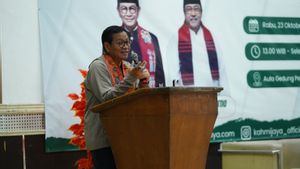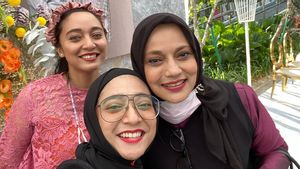JAKARTA - Member of Commission VIII of the DPR PKS faction, Bukhori Yusuf, criticized the Ministry of Religion's policy regarding guidelines for using loudspeakers in mosques/musalas. The regulation is regulated in Circular No. 5 of 2022 concerning Guidelines for the Use of Loudspeakers in Mosques and Prayer Rooms.
Bukhori assessed that the guidelines substantially ignore the dynamics of the sociological and cultural conditions of the local community. Given the scope of the circular, it is not only addressed to mosques or prayer rooms located in urban areas, but also in rural areas.
“The use of loudspeakers in mosques is a tradition for Muslims in Indonesia. For traditional communities who are communal, they have relatively more positive acceptance of the tradition of chanting the call to prayer, remembrance, or recitation aloud through mosque speakers," said Bukhori in Jakarta, Tuesday, February 21.
"In addition to the reason that in communal culture, every individual's behavior is naturally constructed to prioritize the public interest. This tradition also does not find problems when applied in a homogeneous environment such as rural areas," he continued.
The legislator for the Central Java electoral district said that in the cultural construction of rural communities, the loud sound has been transformed into a 'soundscape' or environmental sound. So, said Bukhori, if the frequency or capacity of the sound decreases, weakens, or even disappears, it can affect the mental atmosphere of the population who are usually exposed to the chanting of the sound from the mosque/musala, even though it is carried out in a loud voice. there is a missing part in their daily life,” he said.
Even so, the PKS politician agrees that the phenomenon that is considered common in rural areas is not fully accepted by residents in urban areas. Where to live in a heterogeneous, individualistic, and noisy atmosphere, so that tranquility becomes a coveted thing in the midst of the hustle and bustle of metropolitan life.
“In that condition, setting the loudspeaker at a proportional level becomes something that needs to be done. In addition to maintaining social harmony in a heterogeneous environment, it is also important to maintain public sympathy for the religious activities carried out," he said.
"However, in realizing this, it really doesn't need to be done excessively. For example, through state intervention that interferes with technical matters regarding worship, but it is enough to start from a sense of awareness and open-mindedness of the community, especially for the mosque takmir or DKM administrators," he continued. .
Regarding the importance of supporting community initiatives in realizing social harmony, Bukhori then took the example of initiatives carried out by Muslims in Bali. There they do not use loudspeakers when Hindus commemorate the Nyepi day in the context of respect and tolerance. "It's the other way around with Hindus who understand the use of loudspeakers that are answered by a number of mosques in Bali when welcoming the commemoration of Eid Al-Fitr / Adha even though the number of Muslim minorities there," explained Bukhori.
This member of the Legislative Body also emphasized that loudspeaker regulation should not be accompanied by an element of coercion, but requires a heart-to-heart approach. According to him, those who feel disturbed can convey their objections politely to the takmir. It is also hoped that the takmir will be understanding, wise, and big-hearted in responding to the dynamics of the community affected by the loudspeakers of the mosque/musala by formulating a solution that is humane and does not reduce the essence of religious symbols in the slightest.
"The key is to leave this matter to the community to manage it through tradition or deliberation considering that every village/region has different socio-cultural conditions from one another," he concluded. Previously, Minister of Religion (Menag) Yaqut Cholil Qoumas issued Circular Letter No. SE 05 of 2022 concerning Guidelines for Using Loudspeakers in Mosques and Musala. In these rules, the use of external loudspeakers is no later than 5 to 10 minutes before the call to prayer.
"The guidelines are published as an effort to increase peace, order and harmony among members of the community," said Minister of Religion Yaqut in a written statement, Monday, February 21.
The Minister of Religion explained that the circular issued February 18, 2022 was addressed to the Head of the Regional Office of the Provincial Ministry of Religion, the Head of the Regency/City Ministry of Religion, the Head of the Sub-District Religious Affairs Office, the Chair of the Indonesian Ulema Council, the Chair of the Indonesian Mosque Council, the Leaders of Islamic Community Organizations, and the Takmir/Masjid Administrator. and Musala throughout Indonesia. As a copy, this circular is also addressed to all Governors and Regents/Mayors throughout Indonesia.
"These guidelines are to be used as guidelines for the use of loudspeakers in mosques and prayer rooms for managers (takmir) of mosques and prayer rooms and other related parties," said the Minister of Religion.
The English, Chinese, Japanese, Arabic, and French versions are automatically generated by the AI. So there may still be inaccuracies in translating, please always see Indonesian as our main language. (system supported by DigitalSiber.id)









